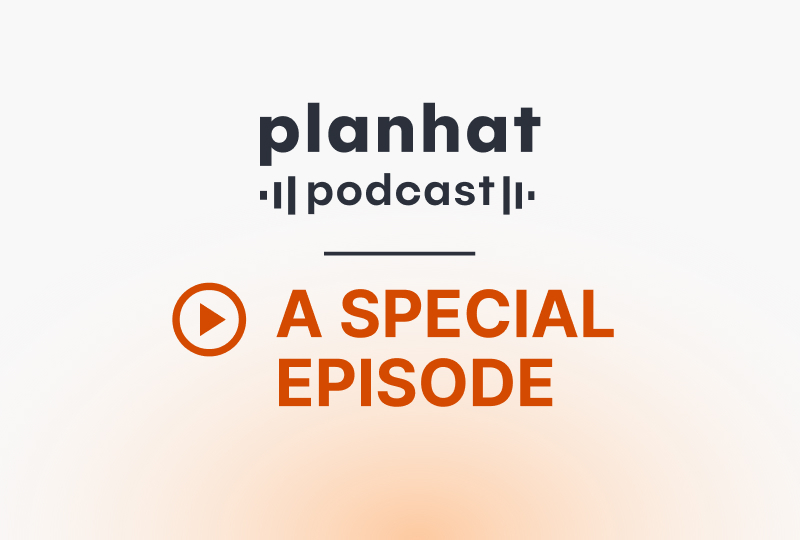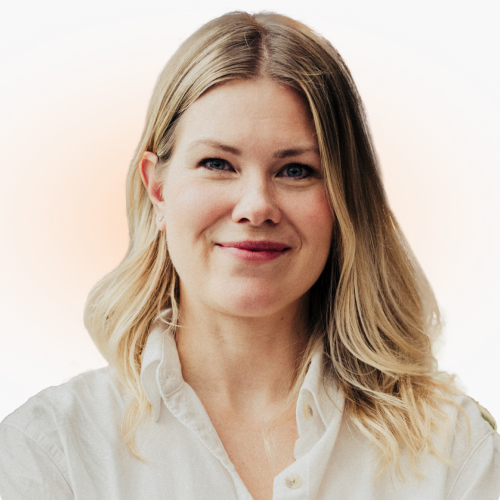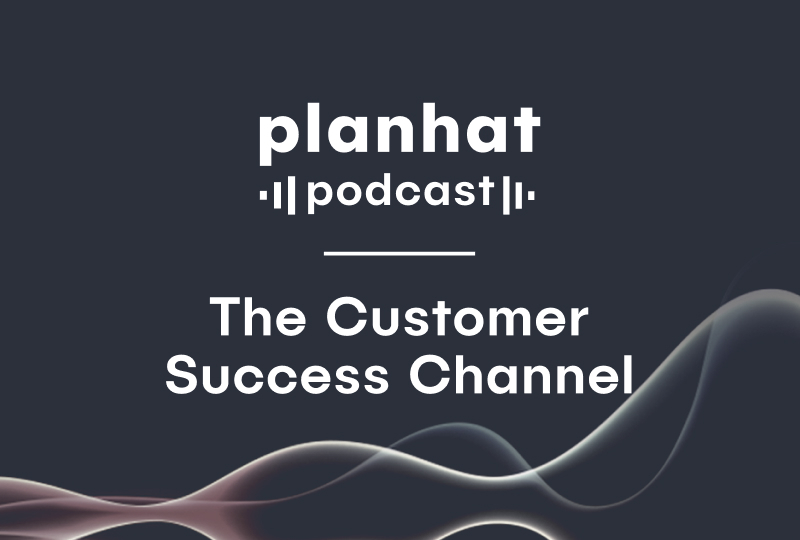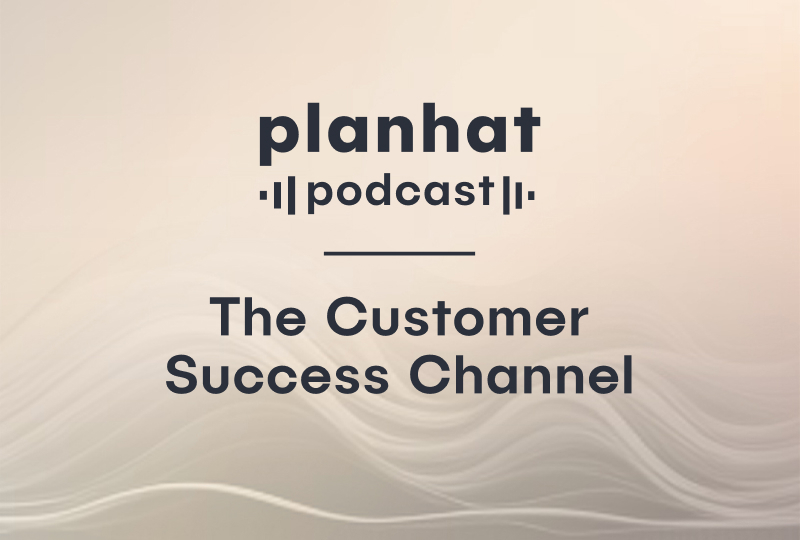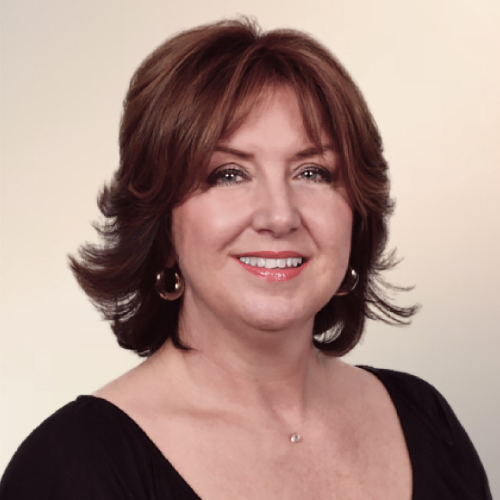2018-03-06
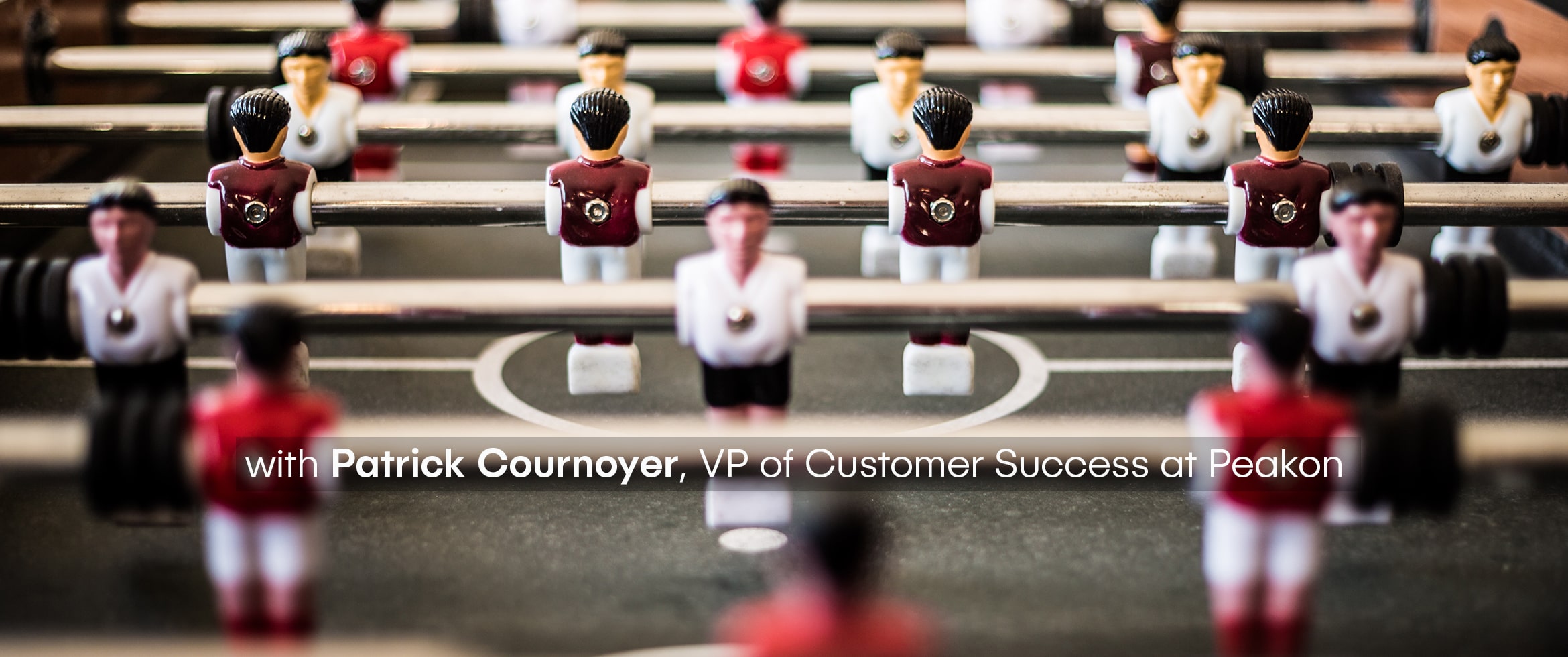
Why Focusing on Team and Relationships is Essential

28 min read
Me video-chatting in from a cold Stockholm and him from an equally cold Copenhagen, Patrick Cournoyer and I had a cozy chat about customer success at Peakon. After speaking with him for just a few minutes I could feel his genuine enthusiasm for customer success and for creating a unique, personal experience for Peakon’s customers.
Patrick was first a customer of Peakon’s before joining their team as VP if Customer Success in 2016. And the experience he had with the company and his customer success manager made him such a fan of the company that he wanted to work with them!
The approach he and the CEO of Peakon have taken to customer success is very people first, and they make sure that the relationship between the customer success manager and the customer never feels transactional - it feels like a partnership.
Megan: Hi, Patrick. Thank you so much for joining me all the way from Copenhagen. You are the head of customer success at Peakon - will you tell us a little bit about Peakon, what you guys do there?
Patrick: Yeah, absolutely. Thank you for having me. I'm super excited to spend some time with you. Peakon is an organization that's based, like you said, out of Copenhagen, Denmark. We are an employee engagement software. Really what our software does is go into organizations and help them on a continuous basis understand their level of employee engagement from a data perspective.
Most employee engagement type products are only survey-based. You get a lot of data, or you get a lot of responses, and then you have to figure out how to understand those responses individually within an organization where you spend hours trying to understand the results that you're getting.
What Peakon does is we're a data analytics platform. We have the brains of our system take all of the responses from employees through a survey process and really provide, from a data perspective, organizations at a large global organizational level all the way down to a front line manager with three, four, five direct reports to them. We provide actionable insights and real-time data for managers, leaders in the organizations and organizations as a whole to be able to drive change in their organization based off of the results that they get from using the platform.
Megan: Very cool. How did you find Peakon?
Patrick: That's an interesting story. I was actually a customer of Peakon before I joined Peakon as the VP of customer success. I'm from San Francisco and I worked for a technology startup company there. At the time we were about two years old as a company and we really needed to understand our organization, understand the level of engagement of our employees. We wanted to be able to have a process for employees to have a continuous way of providing us feedback, and for us as a company to empower our leaders to be, really, leaders of change and to drive change within their individual parts of the organization.
I did a lot of research on different types of engagement products, and I came across Peakon. The organization was fairly new at that point, this was a couple of years ago, and I quickly became one of their first customers. We implemented it into my company and used it there for a while very successfully, which we can talk about in a little bit. Then, my company was acquired and I was kind of deciding what I was going to do next and reached out to the CEO of Peakon and was incredibly impressed with the product and the team. One thing led to another and three months later I was moving 5,000 miles across the world to come and join the leadership at Peakon.
This was back in fall of 2016 and have built the company from there.
"I believed in the product so much and the team that I work with so much that I moved across the world to join the organization."
Megan: That's amazing. What was so unique about the experience that made you had as a customer such an advocate that you're like, "I want to work for you?"
Patrick: There was a couple of aspects I think and I'll kind of take it in three parts. First, the product is incredibly impressive and it has grown incredibly since I was using it three years ago, but the core of the product is the same. What impressed me so much was that I could have a very easy system to be able to setup and use, and It didn't take me a long time to implement it within the organization.
I had an incredible customer success experience, which is really what we're talking about today is customer success, right? I had a customer success manager that really understood and wanted to understand what the needs are or were of my organization, what my personal goals were as a customer, and how Peakon could be a long-term solution for us, and how it could be an asset to us as an organization two, three, four, five years down the road. The platform was incredibly intuitive, I knew that I could get my leadership team onboard to use the product and for them to see it as a resource and a product for them to be able to become better leaders in the organization, and just for us to be able to better engage with our employees. The product just blew me away from a user or from a customer standpoint.
The second thing was is that there was a very smart group of people that was building the product. They were thinking about the concept of employee engagement from a different perspective, from a real-time perspective, which in the world today when we think about products and you think about the software and the technology that you purchased as an organization, you don't want to be waiting for things for months after you complete a "employee engagement survey," nor to be waiting three months to get your results because all of your data, all of your results are out of date at that point, right?
The people at the organization were very, very, very smart. They are today. They're really thought leaders in our space. That was the second thing that really drove me to joining Peakon.
The third thing was about this whole customer success experience, right? I do not have a background in customer success; I have a background of many years in people operations, and classic HR, and employee engagement, and talent development, people development within an organization. I was really the target audience of the product.
I had such an incredible experience with my customer success manager at the time.The way Peakon was looking at creating a relationship with me as opposed to it being a transactional implementation process where I had an implementation manager, then I had an account executive for my sales, and then I had a data manager - I was dealing with multiple different people in many different products that I've used outside of Peakon. [With Peakon] I had one person that I knew was my relationship manager. I trusted her. I trusted that she had not only my best interest, but my organization's best interest at heart. Never once did I feel like I was being put through a transactional process.
Knowing that that was the kind of initial thought process that Peakon had around customer success and knowing that during the process of me talking about joining the company, that that's what our CEO wanted for Peakon to be from a customer success perspective - that's what really made me decide to join the company. Because I was not looking for a customer success role to be totally honest with you. I mean it fell in my lap and I love it. It's fascinating how I ended up here because it's ... We have continued to do that. I'm sure we'll talk about that in a couple of minutes, but that's how I got here.
Megan: I have so many follow ups with just that last bit. I want to know your feelings on having too many people to be handed off to as a customer and what that does, and how that's influenced your structure...I guess my next question would be how is customer success structured at Peakon and then maybe we can answer a bit of having that one contact relationship point in that.
Patrick: Absolutely. The way we structured it now is we have multiple teams throughout the world that regionally have responsibility for customer success. I'll kind of just tell you how we do it regionally and we specifically chose this because it allows for the customer success managers to be very available for customers and for their portfolios that they have. We have teams throughout multiple offices. Our headquarters as I said is in Copenhagen. We have a customer success team here in Copenhagen, I'm based in Copenhagen. We have a senior manager here in Copenhagen and then we have a team of customer success managers.
In London, we have a large team of customer success managers as well. Then we also have an office in Berlin and we'll have a customer success team there as well. Regionally for the team in Copenhagen we handle all of the Nordic...and part of the AMEA region.
We also have the team in the UK which covers all of the UK clients and our US clients as well. I shouldn't say just our US clients, but basically all over the Americas. We have a team in Auckland...that handles more of our APAC region.
The way how we handle customer success is from the process of an account closing or account signing with us, a new customer, a new client signing with us, we have a handover process where the account executive is very much involved in that. The customer success manager owns the entire process from that point forward. The account executive is completely involved in the process as well and the whole relationship with the customer, but the customer has that one point of contact as their customer success manager. We don't have implementation specialists. Our customer success managers are implementation specialists.
We have one additional role, which is called an onboarding specialist, which is an additional member of the team that helps when we do setup more complex organizations or larger organizations. However, that person is part of the setup team, but there's no handoff process, so it's basically the customer doesn't go first to the onboarding specialist, then to the customer success manager, then to engagement specialist, right? The customer success manager owns the entire relationship from day one and brings in subject matter experts to help in certain areas.
For example, if you were one of our customers, your main point of contact would be for example, Normina let's say. She's one of our customer success managers here in Copenhagen. The reason why we do that is because we believe that the customer really has to feel that they can build a trust with a singular person at the organization, so they know that if something happens or something goes wrong or they have a question or they're unsure of something, that they're not having to go to "who should I direct this conversation to?"" We don't want to put the stress points on the customer to decide who they need to direct a question to. We'll take care of that for them. Just ask Normina and Normina will then work with the person to get the answer, potentially involve that subject matter expert in the resolution or the response, but [she]will own every interaction, right?
We find that our customers immediately start building a trusting relationship with us. It's a much more streamlined experience not only for them, but it's also a streamlined experience for us because we don't spend hours sitting down in meetings where five different owners of an account have to calibrate on a weekly or a monthly basis about accounts. One person knows exactly what's happening in the account.
If I need to go and find out about a certain situation or about an account, I can go directly to the customer success manager and find out what's going on with that specific account. The other thing is is that customer success at Peakon is very much as in-person as possible. We heavily use video technology, which is very convenient for a lot of our customers. The amount of times that we have actual phone calls with customers is I would say 5% of our interactions with customers is literally on the phone. 95% is some sort of a visual interface, either by video conferencing or in person.
That's part of that regional aspect that we were talking about where the customer success managers in the UK, they go out to their customers, they visit with their customers, they have in person relationships with their customers because again with that one person point of contact we build these strong relationships.
It's very funny to see now because we have these customers that are three years into their contracts now and they've had the same customer success manager let's say for three years.We join these conversations and it's like we're partners in this employee engagement approach.
"It's not that we're just a service provider for them. I think that's how we differentiate ourselves in a lot of ways from a customer success perspective is that it's not a transactional process in a lot of ways."
I think some organizations think, feel that they're providing a better service to customers by saying, "Well, we have all these subject matter experts that specialize in these different areas," but I personally and we at Peakon don't feel that way because we feel that actually just creates more complexity and potentially confusion for the customer, which is the last thing we want to do.
Megan: I love how human that is...I think we all want something simple in our lives at this point... So, you have a very customer success minded CEO. From the beginning, he's been making it so that [the culture of customer success] was built. When you came in, what were the, not expectations, but how did you learn the culture and the vibe from him?
Patrick: Yeah, absolutely. He's extremely involved with our customers as a CEO, which I love because the customer needs to feel that they have access to the CEO of an organization. I think that very human side of it that you're talking about...He wants to understand our customers and he wants to understand very specifically how we can build the product, continue to drive the product forwards so that it's the most effective platform for our customers. When I first joined the organization, it was funny, in one of our first conversations, he said to me, "... I’d love for you to come and think about leading customer success for us at Peakon."
I said, "Phil," his name is Phil, I said, "I will be completely honest with you. I have no background in customer success like I told you before. I have a lot of background in relationship building. I have a lot of experience with creating experiences for internal customers or internal clients. What I can do is bring you that experience-based approach as opposed to a type of classic customer success approach." He said, "That's exactly what we want, right? When you come in, let's talk about how you do that."
I joined the organization and the majority of my background is within the airline industry. I've worked at five airlines and I've been responsible for many different aspects of airline operations. In particular, the majority of my career has been spent with front line crews. I worked with cabin crew quite a bit. I worked with any type of customer experience team member that you would have at an airline I was involved with. We sat down and looked at how did we ... Most recently I worked for Virgin America and I was there for nine years, which is a very well-known airline in the US, an airline that really changed the airline industry in the United States because of the approach that we took to not only the customer experience, but the employee experience.
Phil and I sat down and said, "How can we incorporate creating an awesome customer experience? The things that you created in these totally different industries, how can we create that in a SaaS world?" At Virgin America for example, you always put the customer first. You always create a unique experience for your employees. You create a unique experience for the employees that work in your organization. How can we do that with our customers? How can we create that unique experience? That's how it all started. It really started with how, as a leader, I could do that, and how Phil could be involved in creating those unique experiences from a CEO perspective.
Then the other thing that was very critical, and Phil and I talked a lot about this, is the people that choose to work at Peakon. The people that we choose to be the customer success managers are in my opinion, and in Phil's opinion as well, is the most important decision that we can make as a company. We talked a lot about the people that we were going to bring on as customer success managers because could they see that vision of I'm going to create a unique experience with every single customer that I have in my portfolio. Phil and I both said, "We have to pick the right people."
That's how it all started was picking the right team because we were growing this from the ground up, and how can we create a unique and individualized experience. That's how it started.
Megan: One of my final questions that I ask every interview is what you look for when hiring, so we'll save that one.
Patrick: Yeah, sure. Absolutely. Good. Yeah.
Megan: It's fun when someone has like a very specific well-thought out answer and it sounds like you do, so we'll save that one. It doesn't sound like you have this problem, but sometimes I think, when speaking to other customer success managers it can be an issue, how do you prove ROI of customer success? Some metrics are tangible and are some a little bit intangible like some relationship aspects. What are some ways that you would think you can prove ROI?
Patrick: We're in a unique situation where our product is very specifically driven around employee engagement, right? For us, showing ROI of our product is a bit easier where you may have some technologies or customer success for a lot of technologies [where] being able to show the product is impacting ROI within a business I think can sometimes be a bit more challenging.
From a customer success perspective, if we create a really strong unique individualized relationship with our customers, we partner with them and we see the process through, and I think any customer success part of an organization or part of a SaaS product or whatever type of technology, I think seeing the product through and partnering with your customer is really where that ROI starts coming in, right?
Because if we look at customer success as we're going to help you implement the product and then we have a customer support channel that you can contact for any type of issues that you have. A lot of organizations have that set up, right? The customer success managers or the account managers, how would they know where the challenges are or where things could potentially start needing to change in an organization if they're not consistently in that relationship mode with the customer?
"I think that being able to show the ROI on more relationship-based customer success is that we're very able to identify if there's a shift or a change within an organization that could potentially change the relationship that we have with the customer. The only way how we do that is because we're consistently meeting with, having conversations with and understanding our customers."
If we were to just say, "Let's get the product implemented and you come to us or we're here for you when you need us," there's a lot that we missed out on… we do it on the flip-side. We say, "We're going to keep coming to you, and letting you know what we can do for you now and asking you what we can do for you." If there's nothing, that's no problem. Great. We'll be like, "Hey, we'll talk to you next time," right? If we're not proactive that way, then we would miss out on a lot of potential areas that we should know.
I think that proactivity helps us internally to demonstrate ROI with customer success within Peakon because we could do it a different way and potentially have customer success managers with a much larger portfolio and basically staff less. Have less employees with a heavier customer load or customer portfolio load because it's a more transactional experience, but instead we do it the other way where we have a lower number in a portfolio for our customer success managers so that they can maintain those relationships because we feel that that relationship is going to absolutely be correlated with the length of time that a customer is with us.
I think that investing in relationship-based customer success approach actually strengthens your organization more because I think your renewals are going to be higher, right? People renew, our customers renew at Peakon because the product is amazing, number one, but because Normina is their customer success manager or Gustav or Joy, Ashley. It's because they say, "You are my partner in this, not just your technology is amazing." I'm very proud of that. That's a huge I think return on investment.
Megan: I think in today's subscription economy, there's technologies everywhere. There's no lack of technologies. What you really want is that partner. We can go from the next to the next if you don't have ...
Patrick: It's true. I really love this. I don't think another company can ... I know. Actually I'm going to say I know another company to not replicate the team that I have, that we have at the company, and the approach that they take to the relationships that they built, right? We've always kind of looked at that and I've always looked at customer relationships like that. I mean Virgin America was another great example, right? An Airbus 320 is an Airbus 320. You can put in mood lighting. You can have the same seat, but the people, you can't replicate the people. You can't replicate the experience that the people have at the organization.
We really prided ourselves on that and I think that's what led us to the success, the people that we had. We take the same approach here. You're right, subscription-based services, there's a lot out there...[but] My team and our team at Peakon can't be replicated. I think leaders of customer success really thinking about the team that they have and how their team is unique in creating something unique for their customers, that's I think where the big return on investment comes from.
Megan: Peakon's all about improving employee engagement in the workplace. How do you think having a product like that has influenced your customer success strategy and the team and the culture?
Patrick: We obviously use the product internally, right? We get our surveys every week. Obviously we have a highly engaged team. If we didn't, it would be very difficult for us to go out and yeah, exactly, sell our products or stand behind our product if we didn't really create a great experience for our employees.
We have a very unique culture here. We have a very unique organization. We very much listen to our employees. We continuously iterate on our process with customer success based off of, directly based off of, the feedback from our members of our team, of the customer success team in particular.
We share all of our feedback. I share all of our feedback that the team gives us in particular around growth and development and strategy and freedom of opinions. These are all different types of things that we understand through using the Peakon platform. My team provides us a lot of feedback through that product, through our Peakon product. That does drive how we look at our processes going forward.
For example, in a couple of weeks we have an offsite for my entire team. A lot of the agenda, [a lot of what] we're talking about is how can we become even more solidified as a customer part of the organization, how can we support each other better, how can we iterate on our processes so that they're even more relationship-based, even more unique. It's a very collaborative process that we have. I mean I think our product allows us to do that because we use it internally. I mean even if you're not using Peakon, I think the process of understanding how customer success managers see what needs to change and how you can make things better is gold for us as well because they're working with the customers everyday.
They're understanding their portfolios everyday. That's how we do it and we're constantly doing it. We're constantly challenging ourselves on how can we make, how can we create an even more unique relationship.
Megan: That's awesome. That sounds like so much fun too.
Patrick: It's a fun company.
Megan: I want to make sure I get these last three questions in with you.
Patrick: Sure.
Megan: Well, we'll start with, because I know I'm excited for this answer, what do you look for when hiring a new person onto your team?
Patrick: Recruiting is one of my favorite things to do. I love it. I've done it for years because I think that there is no ... Any company that has the idea, that there's a perfect candidate profile for a role I think misses out on some really amazing potential additions to their teams. When we look for candidates, we look for an extremely diverse team in the organization, in particular in customer success we are a very diverse team... The high majority of our customer success managers have no background in customer success. You're probably hearing a repetitive pattern here, right? Like me not having customer success background, right?
Megan: Yeah. It doesn't mean anything, right? It just means that ...
Patrick: Yeah, exactly. The team that we have recruited is excellent at project management and that can come in a lot of different types of roles. We have a couple of people on our team that have been event managers. I think that is a really interesting skill to have because there are three areas I think in working in a fast growing young organization, in a technology-based SaaS organization, I think that you have to be really good at. You have to be excellent at dealing with ambiguity because fast growing companies there's usually a lot of things that are quite ambiguous, right?
When you have a new customer, it's a new chapter with every customer and every customer has different expectations, has different needs, and we have to be that for every customer. Dealing with ambiguity and handling ambiguity and thriving in that type of environment is very important.
Being able to manage and again thrive in an environment that is full of competing priorities. Everyday our world is full and customer success is full of competing priorities. We look at those event managers for example. They're being pulled in 10 different directions and have this responsibility to create something that is shiny and bright and perfect with about a thousand different things going on in the background, right? That's a very interesting skill-set that has proven to be useful. We have a couple of customer success managers that are excellent and they constantly pull in from those experiences that they've had in event management. That's the other thing. The second thing that we look at is being able to thrive in an environment of competing priorities.
I think the thing that we really look for is people that are just able to have a conversation, right? That comes in a lot of different packages and a lot of different ways. When we sit down and have "interviews" with people, we go through a very kind of normalized interview process. We want to put all of everybody through a fair and consistent interviewing process. Through that process, if somebody can have a conversation and be disarming in a lot of ways in their conversation, that is a skill that cannot be trained. That is a skill that is inherent in a person, right? You are either good at having conversations and interacting with people or that's not a strength area for you. It's very difficult to train that. We can train how to implement the technology product. We can train how to use a technology system. What we can't train is intuition, is a personality, is how people interact.
"...how people have conversations, and how people would handle stressful situations which is where this ambiguity and this competing priorities comes in. Those are the things that we look for, and those come from many different backgrounds."
Some do have customer success backgrounds, but it is absolutely not the first thing that we look for at all. We love the variety of people in our team.
Megan: Those are fantastic things. Thank you so much.
Patrick: Yeah, sure.
Megan: What is your definition of customer success?
Patrick: I think that customer success truly is the ability to build a meaningful and long-term relationship that's really designed around the ultimate goals and the ultimate image or vision of success from the individual customer perspective. I think it's about simplifying and making the entire experience not only easy for the customer, but also being respected and trusted by the customer. Because if we capture that and we can create that, then we feel we're going to have a long-term relationship with that customer.
Megan: Yeah. Then I do also want to ask what is your biggest learning mistakes since working in customer success?
Patrick: I mean not having a customer success background, right? I learned a lot for sure. Probably the biggest learning is ... This is just being part of a growth company, but I also think this could happen at any company even if you're not in a growth cycle, I think really being aware of workload and staffing planning for the future is very important because our recruitment process and cycle is quite a long one. That's a good thing in my opinion, right? Because we're so selective of the people that we choose. I would never hire somebody for the sake of hiring because there was like a workload need.
I would rather, and the entire team would say this as well, like we’d rather work harder...to make sure that we get the right people in the team.
The one thing that we're doing better now this year than we did last year is really thinking about our recruitment timeline, looking at our growth for the next year to two years, and making sure that we our staffing plan is meeting those needs because part of allowing a customer success manager to create these incredible experiences for customers is allowing them to have a manageable workload and is allowing them to be able to give the time to the different customers so that they have those times to build those relationships.
I think that's something that we're doing much more efficiently now. Especially for startup companies or young companies, it's very easy just to ... You're just growing, growing, growing, right? You're concentrating on customers and you're concentrating on creating these experiences. I think looking down the road saying, "In a year, we're projected to have X amount, so we should really be giving ourselves plenty of lead time not only for recruiting, but for onboarding and making sure that the customer success managers are really fully confident by the way they're taking on their portfolios."
Megan: Yeah. Yeah. Instead of just making a quick hire.
Patrick: Yeah, exactly. Yes. That's usually a mistake for a lot of organizations is not really taking the time to do the full recruitment process.
Megan: Yeah. Thank you so much.
Join our newsletter!
Receive the latest news, updates, and invitations to our events.
Big thanks to Anika, and a cheerful hello to Malin!
A special podcast episode celebrating Anika Zubair's farewell and welcoming Malin Skoglund as our new host.
Customer success is not sales
Our host Anika Zubair chats with Brandon Ramsey, Head of Customer Success at OnsiteIQ about how to make sure customer success is not sales.
Planning for Customer Success in 2024
Our host Anika Zubair chats with Sue Nabeth Moore, Co-Founder of Success Chain about the future of customer success.
Learn more about
Planhat
Drop your email and let us show you our platform!
